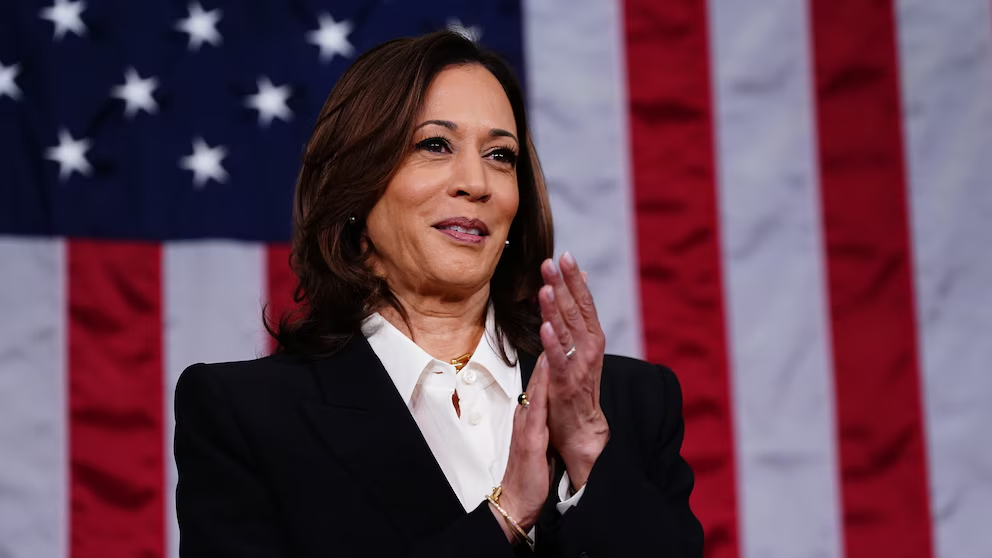
- Commodities
- Indices
- Stocks
Harris administration: investor forecasts
Do you want to know how to make money from this?
Register for free and get expert advice, access to a training course and webinars.
Key points:
- A Harris administration could potentially raise the tax rate from 21% to 28% to ensure fair taxation.
- Higher taxes could reduce the budget deficit, but would hurt corporate profits.
- Harris also proposes measures to combat price gouging on food and reduce health care costs.
Investors are grappling with the market implications of a possible Kamala Harris presidency that could weigh on corporate profits through higher taxes while putting pressure on consumer staples and boosting solar energy.
The focus of this week’s Democratic convention is Harris’s nomination, following her late entry into the race following the withdrawal of President Joe Biden, which has escalated her standoff with Republican nominee Donald Trump.
How might a Harris presidency differ from Biden’s?
Investors’ views on the markets are typically shaped by factors like the economy and interest rate trends, but the question of what approach a Harris administration might take to policy, regulation, and taxes is increasingly important. It appears poised to be more forceful than the Biden administration on many market-related issues, said Frank Kelly, senior policy strategist at investment firm DWS Group, citing Harris’s recent economic initiatives and her experience as a U.S. senator and California attorney general.
Harris proposed Monday raising the corporate tax rate to 28% from 21%, a move her campaign described as a way to “ensure billionaires and large corporations pay their fair share.” The plan contrasts with measures taken by Trump, who as president cut the corporate tax rate to 21% from 35% and has sought to make other tax breaks permanent.
How could US tax hikes affect markets?
According to the nonpartisan Committee for a Responsible Federal Budget, raising the tax rate could reduce the U.S. budget deficit by $1 trillion over the next decade, a major issue for some investors. But higher taxes could hurt corporate profits.
Goldman Sachs strategists say that every one percentage point change in the domestic corporate tax rate could reduce S&P 500 profits by nearly 1%. Many of the candidates’ proposals would depend on approval from Congress, which is currently divided between Republicans and Democrats. Control of the House and Senate will be a hotly contested issue on Nov. 5.
Harris’s tax proposal could face significant challenges in Congress, which is either divided or controlled by Republicans. Polls show that the presidential race between Harris and Trump remains tight and will likely be decided in several key battleground states. Harris has been leading in recent weeks on the political betting platform PredictIt.
Harris’ plans for food, health care and solar energy sectors
Rising expectations of a Trump victory over Biden have sparked a so-called “Trump trade” in U.S. stocks in the past month, boosting sectors of the market seen as benefiting from tax breaks and regulatory relief, including smaller U.S. stocks and cryptocurrencies.
Harris unveiled a plan last week to ban price gouging on food products, which her campaign says is aimed at preventing big corporations from exploiting consumers. Harris has also focused on reducing health care costs, and analysts expect she could expand the powers to negotiate prescription drug prices that were put in place under the Biden administration. Lori Calvasina, head of global equity strategy research at RBC Capital Markets, said in a note this week that the proposals could put pressure on staples and health care stocks.
King Leap, chief strategist at BakerAvenue Wealth Management, expects clean energy initiatives launched under Biden to be continued under a Harris administration. That could provide relief for solar stocks, which have struggled because of high U.S. interest rates, Lip said. The Invesco Solar ETF is down more than 20% this year.
Kamala Harris says she will seek tax cuts for middle class
Democratic presidential candidate Kamala Harris said in a speech at the Democratic National Convention on Thursday that if elected, she would seek to cut taxes for the middle class.
Harris emphasized that her opponent, Republican candidate Donald Trump, has shown no concern for the middle class. She has made strengthening the middle class a key goal of her presidency and promised to create an “opportunity economy” in which everyone has a chance to compete and succeed.
Do you want to know
How to make money from the news
Register for free and get:
- Expert consultation;
- Access to the training course;
- Opportunity to participate in webinars

